Sarah Everard vigil: Boris Johnson 'deeply concerned' by footage
Boris Johnson has said he is "deeply concerned" by footage showing police officers detaining women at Saturday's vigil to remember Sarah Everard.
The prime minister will chair a meeting of the crime and justice taskforce later to discuss ways to protect women.
Officers handcuffed women and removed them from the gathering on Clapham Common in London on Saturday.
Met Police Commissioner Dame Cressida Dick has dismissed calls to resign and defended the force's actions.
She said she was "more determined" to lead the Met, and hit out at "armchair" critics.
Dame Cressida will join Mr Johnson at the taskforce meeting, which will discuss what further action is needed to make streets safer for women.
Government sources said both Home Secretary Priti Patel and the prime minister had confidence in Dame Cressida.
Ms Patel has instructed the police watchdog, Her Majesty's Inspectorate of Constabulary (HMIC), to "conduct a lessons learned review in to the policing of the event", the prime minister has said.
Mr Johnson said he was "deeply concerned" by the scenes on Clapham Common on Saturday night and that Dame Cressida had "committed to reviewing how this was handled".
"The death of Sarah Everard must unite us in determination to drive out violence against women and girls and make every part of the criminal justice system work to protect and defend them," he added.
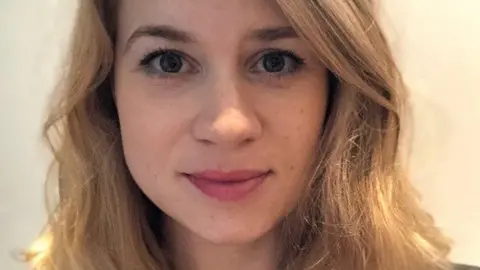
Dame Cressida said she agreed on the need for a "sober review" and defended how officers responded to the "really big crowd".
"They have to make these really difficult calls and I don't think anybody should be sitting back in an armchair and saying 'well that was done badly' or 'I would have done it differently' without actually understanding what was going through their minds," she said.
She added that what happened to Ms Everard made her "more determined" to lead the organisation.
Four people were arrested for public order and coronavirus regulation breaches, the Met said.
Hundreds gathered at the bandstand in Clapham Common, south London, on Saturday evening for a vigil for Ms Everard, who went missing while walking home from a friend's house on 3 March.
Her remains were later found in woodland in Kent and Met Police officer Wayne Couzens, 48, has been charged with the 33-year-old's kidnap and murder.
Louise McLoughlin was one of those at the bandstand on Saturday. She told BBC Breakfast it was "a really lovely scene" when she arrived at around 18:00 GMT, but "it started to get a bit more riled" around half an hour later.
"The decision was obviously made for [the police] to move in and take over the area," she said.
"At that point, it became a bit of a push and pull and there were a few scuffles and all of the candles and glass and the signs and the flowers that would have been put down for Sarah, you could just hear the breaking of glass now and again as these things were trampled on."
'We were silenced'
One of the women arrested, Dania Al'Obeid, said she knew the vigil had been cancelled but she "needed to go and pay my respects".
She told Radio 4's Today programme: "I think that is where the frustration was, the bigger picture here was lost - we felt like we were silenced."
Another of those arrested, Patsy Stevenson, whose photograph featured on many newspaper front pages, told Sky News: "I've been thrown into the public eye and the only way I can make this not in vain is to not make it political, not against the police, it's just about the safety of women and we need to talk about it."
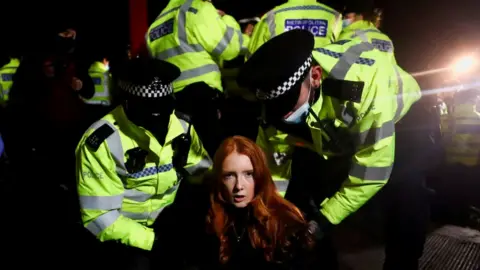 Reuters
Reuters

Maintaining public order at protests is one of the hardest jobs in modern policing. If everything goes well, the public won't notice how commanders and demo organisers have worked out how to make an event safe.
But when it goes wrong, then the inevitable accusations of failure come piling in.
Sunday dawned badly for the Metropolitan Police's commissioner, Dame Cressida Dick. Her officers were accused of oppressing women and politicians waded in calling for her head.
But the seeds for Saturday's PR disaster for the force were sown in the legal dispute over whether a vigil could take place at all - and how events then seemed to run out of control.
The question is whether the police should have foreseen that happening. That, time and again, is the great challenge of public order policing.

Asked whether police could have used their discretion as they did when taking the knee with Black Lives Matter protesters or dancing with Extinction Rebellion, Martin Hewitt - chairman of the National Police Chiefs' Council - told Today that the investigation into the Met's actions "will look at all elements" of the event.
Sir Peter Fahy, former chief constable for Greater Manchester Police, said HMIC had previously criticised the police for not intervening enough in Black Lives Matter protests and that many officers felt they were "damned if they do and damned if they don't".
He added that current techniques for removing people from events safely "means that they normally have about five officers - one on each limb and one holding the head".
"The trouble is, when you photograph that, it then looks very heavy-handed," he said.
The force's action at the vigil have drawn widespread criticism, with images and footage showing officers forcibly detaining women.
London Mayor Sadiq Khan described the police's actions as "unacceptable", adding he was "not satisfied" with the explanation provided by Dame Cressida and the deputy commissioner when he spoke to them.
He said he wanted HMIC to investigate the events and for the Independent Office for Police Conduct to investigate the actions of police officers.
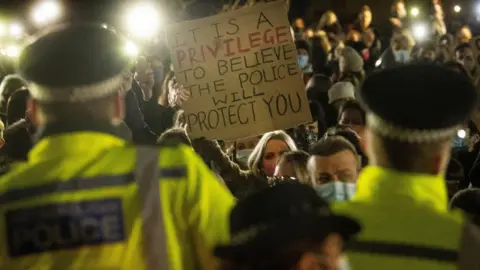 PA Media
PA MediaBut Dame Vera Baird - the victims' commissioner for England and Wales - said the focus must now return to women's experience of sexual harassment and violence rather than the police's handling of Saturday's vigil.
Dame Vera told the BBC: "Let's return to the issue, which is why is it that this number of women, when this awful event [Sarah Everard;s death] has occurred, have started to talk about their appalling experiences.
"They regard, quite clearly, the streets as lawless for women when it comes to male behaviour. Men it seems, they tell us, they can do what they want and say what they want, and nobody will take action."
Ahead of the event, organisers Reclaim These Streets had called off the vigil, saying the police had failed to "constructively engage" on how it could be held in a Covid-secure way.
The NPCC's Mr Hewitt tweeted that he would "bring all police chiefs together" on Monday to discuss "what more we can do to better protect women".
In a letter to Dame Cressida, posted on Twitter on Sunday, Reclaim These Streets accused the Met chief of putting those who attended "at a serious health risk through a lack of Covid-safe marshalling" and "at risk of being manhandled, fined and arrested" by officers.
The group said it believed the Met had misrepresented a High Court ruling on Friday, when a judge refused to say the event would be permitted under coronavirus regulations.
Labour leader Sir Keir Starmer said the scenes were "deeply disturbing", while Liberal Democrat leader Sir Ed Davey has called for Dame Cressida to resign.
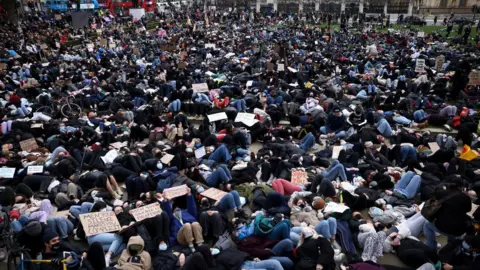 Reuters
ReutersThousands congregated in central London on Sunday to protest about violence against women.
Sisters Uncut held an event outside the Metropolitan Police's headquarters at New Scotland Yard, which it said was to remember Ms Everard and demonstrate against broader "police brutality".
Demonstrators chanted "shame on you" at police and officers erected barriers around the building near the Houses of Parliament in central London.
In Parliament on Monday, MPs will discuss the Police, Crime, Sentencing and Courts Bill, which critics say could lead to further crackdowns on people's right to protest.
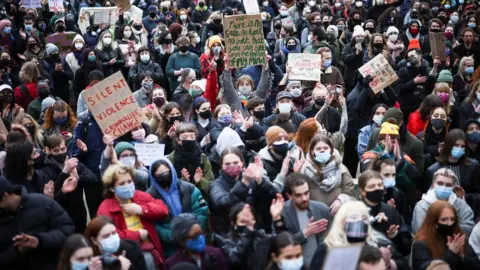 Reuters
Reuters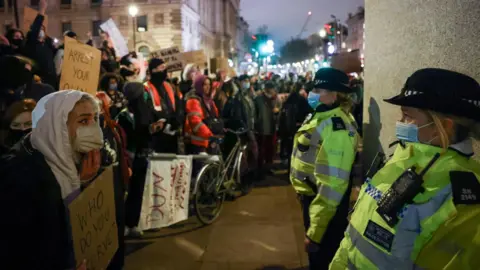 Reuters
Reuters
What are the rules on gatherings in England?
- Under the current lockdown rules two people can meet for recreation outside, which can include "coffee on a bench"
- From 29 March people will be allowed to meet outdoors, either with one other household or within the "rule of six"
- Police can break up illegal gatherings and issue fines of £10,000 to someone holding a gathering of more than 30 people
- During last year's restrictions, when Black Lives Matter and anti-lockdown demonstrations took place, police took a hands-off approach to protests


Have you been affected by any of the issues raised? You can get in touch by emailing [email protected].
Please include a contact number if you are willing to speak to a BBC journalist. You can also get in touch in the following ways:
- WhatsApp: +44 7756 165803
- Tweet: @BBC_HaveYourSay
- Upload pictures or video
- Please read our terms & conditions and privacy policy
If you are reading this page and can't see the form you will need to visit the mobile version of the BBC website to submit your question or comment or you can email us at [email protected]. Please include your name, age and location with any submission.


